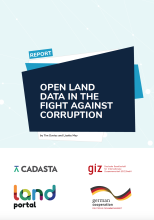Land Library Search
Through our robust search engine, you can search for any item of the over 73,000 highly curated resources in the Land Library.
If you would like to find an overview of what is possible, feel free to peruse the Search Guide.
/ library resources
Showing items 1 through 9 of 31.Sud-Cameroun Hévéa (“SudCam”), a giant monoculture rubber plantation and a Cameroonian subsidiary base of Halcyon Agri Corporation Limited (“Halcyon Agri”) has come under intense scrutiny and criticism due to the severe human rights violations and threats to biodiversity inflicted upon the surrou
Esta obra propõe uma reflexão aprofundada sobre a realidade política e social da Guiné-Bissau. Ela resulta de uma pesquisa inédita, destinada a captar, processar e analisar a opinião pública do país.
Land corruption – corrupt practices in the land sector – threatens the lives and livelihoods of people and communities, the environment and climate, food security and political stability. Its impacts are particularly acute for 2.5 billion people who live on and from the land.
Green energy (and/or renewable energy) requires large areas of land to operate, often more so than energy generated from fossil fuels. The acquisition of land comes with accompanying corruption risks which can lead to challenges such as land grabbing and illegal displacement of communities.
“Nature-based” solutions to climate change require the acquisition of large swaths of land for reforestation, afforestation, conservation and renewable energy sources.
Trois sociétés multinationales – Agilis Partners, Kiryandongo Sugar Limited and Great Season SMC Limited – sont impliquées dans des accaparements de terres, des expulsions violentes de personnes hors de leurs habitations et à l'origine d'innombrables humiliations et du désespoir de m
From 9th to 29th September 2019, Land Portal, Cadasta and GIZ co-hosted an online discussion focussing on the role of open land data in the fight against corruption.
Humanitarian and development organizations working in conflict-affected settings have a particular responsibility to do no harm and contribute to the wellbeing of the population without bias.








